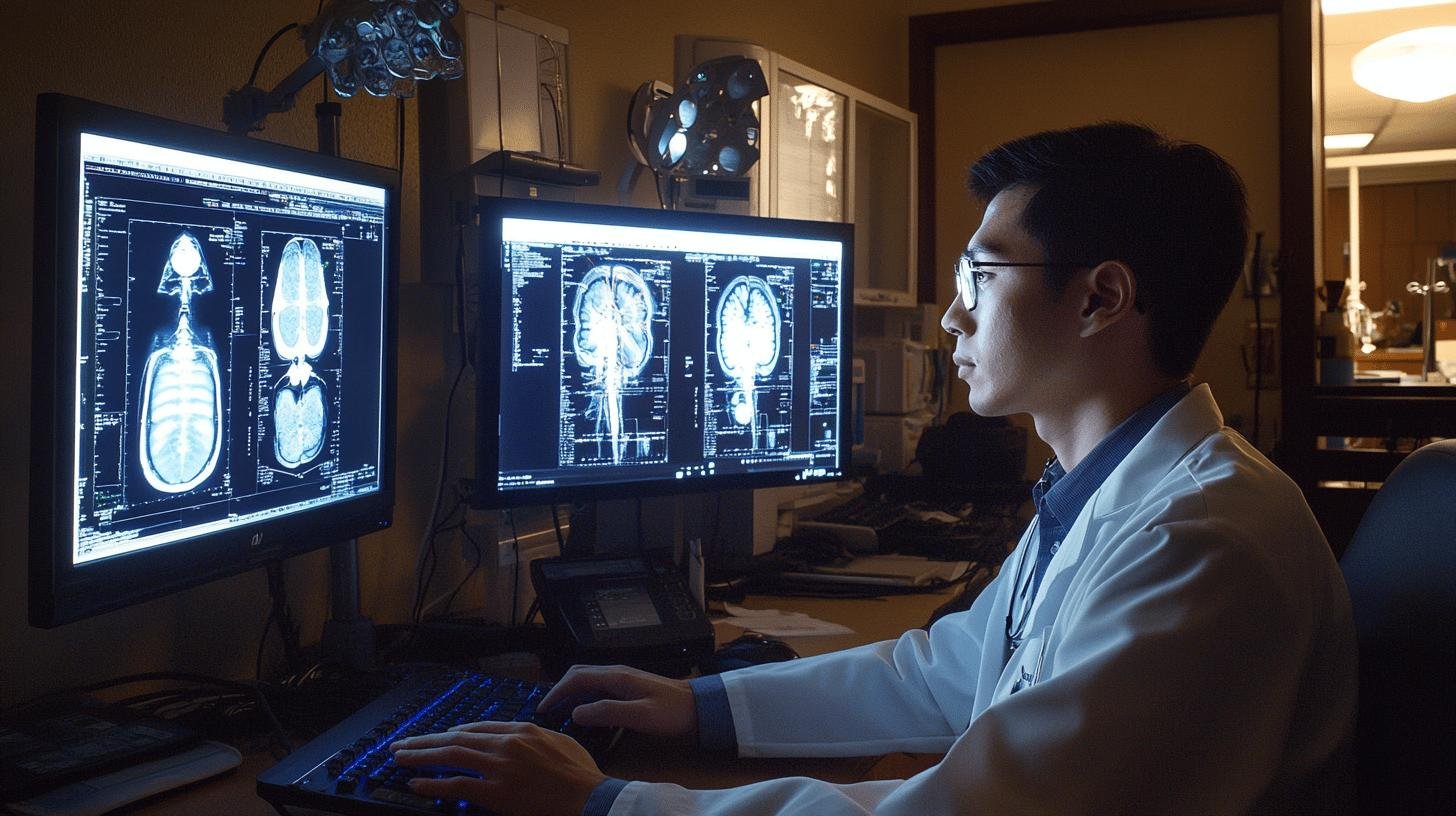The future of AI in healthcare might just make that a reality, and it’s happening sooner than you think. We’re talking about transformative innovations that can change everything from diagnosing illnesses to personalizing treatment plans. Imagine AI analyzing your lifestyle and genetic information to craft a health plan just for you. Super cool or super scary? Let’s find out how AI is shaking things up in healthcare and why it might just be the revolution we’ve all been waiting for. Let’s see what’s on the horizon!
The Transformative Role of AI in Healthcare
AI is transforming the healthcare sector by performing tasks traditionally requiring human intelligence, like decision-making and problem-solving. Trust me, the future of AI in healthcare is the bomb! Imagine a world where AI helps doctors diagnose ailments faster and more accurately. This reality is upon us as AI delves into vast amounts of data—from genetic information to daily habits—to recommend precise treatments.
It’s the future of AI in healthcare, my friend. It acts as a highly intelligent assistant, ensuring patients receive optimal care. In essence, AI is entering healthcare systems like a tech-savvy superhero, ready to diagnose, treat, and manage diseases with precision.
AI’s Impact on Healthcare:
- Diagnostic Precision: AI tools enhance the analysis of medical images, identifying issues swiftly.
- Disease Prediction: AI forecasts disease outbreaks and trends by analyzing data.
- Personalized Treatment Plans: Customizing treatments with detailed personal data.
- Virtual Health Assistants: Assisting patients in managing their health at home.
- Drug Discovery: Accelerating the identification of new medicines.
Looking forward, the future of AI in healthcare is only expected to expand. Picture ultra-advanced predictive analytics capable of detecting diseases before symptoms arise. We’re also approaching more personalized medicine, where treatments are as unique as individual fingerprints. With AI technology evolving, the possibilities in healthcare seem boundless, promising a future of more efficient and effective patient care.
AI-Driven Innovations and Their Impact on Patient Care

AI acts as a catalyst for diagnostic tools in healthcare. The future of AI in healthcare is epic due to the fact that it leverages sophisticated algorithms. AI can analyze medical images more accurately and quicker than multiple human experts combined. Consider how MRI scans or X-rays are examined—AI detects subtle patterns that could be overlooked. This enables doctors to identify issues promptly, leading to faster patient treatments. It’s akin to upgrading from a horse-drawn carriage to a race car when diagnosing medical conditions.
AI is also transforming early disease detection. Imagine a tool capable of identifying cancer before it presents symptoms. AI leverages pattern recognition to forecast and uncover health issues before they escalate. It’s like having a crystal ball for healthcare. Early detection is vital, as the sooner a disease is caught, the better the chances for effective treatment. Thus, AI not only assists doctors but also provides patients with a definitive advantage from the start.
Key AI-Driven Tools Improving Patient Care:
- AI Imaging Software: Enhances the interpretation of radiological scans.
- Virtual Health Assistants: Offers personal health advice and reminders.
- Predictive Analytics Tools: Uses data trends to forecast potential health risks.
- AI-Based Genomic Testing: Analyzes DNA to create personalized treatment plans.
These AI-driven innovations significantly elevate the quality of patient care by enhancing diagnostic accuracy and facilitating earlier disease detection. As a result, treatments become more individualized, leading to better patient outcomes and satisfaction. It’s like crafting a tailor-made suit for healthcare rather than offering a one-size-fits-all approach. AI is paving the way for a future where patient care is precise and personal, ensuring timely responses to patient needs.
Predictive Analytics and Personalized Medicine: The Future of AI in Healthcare
Predictive analytics functions like a weather forecast for your health. It uses AI to process extensive data—from patient records to environmental factors—and predicts disease outbreaks before they occur. The question, “How does predictive analytics help in healthcare?” has a straightforward answer: it identifies patterns that could lead to health issues. By forecasting and preventing diseases, healthcare professionals shift from being reactive to proactive. Consider being aware of a local flu outbreak before it strikes, allowing for timely vaccination. AI renders healthcare smarter and more efficient by converting data into actionable insights.
Conversely, AI is turning personalized medicine from a dream into reality. When asked, “What’s the role of AI in personalized medicine?” the answer lies in AI’s ability to analyze genetic, clinical, and lifestyle data to customize medical treatments. Imagine instead of a generic approach, AI tailors treatments as precisely as a bespoke suit. It scrutinizes your DNA to determine what works best for you. Whether adjusting drug dosages or suggesting lifestyle changes, AI ensures treatments are as individualized as you are. This transformation in personalized care promises improved outcomes and greater patient satisfaction.
Advantages of Predictive Analytics and Personalized Medicine:
- Early Disease Detection helps identify potential health risks before they escalate.
- Personalized treatment plans help adapt healthcare based on genetic and lifestyle data.
- Efficient Resource Allocation Predicts demand and supply for better resource management.
- Improved patient outcomes can achieve better recovery rates with customized treatments.
Overcoming Challenges: Ethical and Regulatory Aspects of AI in Healthcare

One major challenge of AI in healthcare is data privacy. With AI analyzing vast quantities of personal information, securing it is critical. Another ethical dilemma involves bias in AI algorithms. Biases can emerge if AI systems learn from unbalanced data, leading to unfair treatment decisions. It’s like having a bias in robot programming, which shouldn’t exist! Ensuring AI treats everyone fairly, regardless of their background, is essential to building trust in healthcare.
How is the regulatory landscape for AI in healthcare changing? It is evolving swiftly, with new rules and guidelines introduced to ensure AI technology remains safe and effective. One such framework, the NIST AI Risk Management Framework 1.0, guides developers in building trustworthy AI systems by outlining risk management strategies. Think of it as a rulebook ensuring fair play within healthcare settings.
Why are ethical frameworks and regulatory compliance significant in AI healthcare applications? They ensure AI systems are not only innovative but also safe and equitable. Regulatory compliance offers a safety net, guaranteeing AI meets standards protecting patient rights and data. This framework is vital for fostering trust between patients and AI-driven healthcare solutions. By adhering to these guidelines, the collective AI potential can be utilized without sacrificing ethics or safety.
AI’s Future Trends and Innovations in Healthcare
The future of AI in healthcare includes robotic surgery and AI-driven drug discovery. Robotic surgery provides unmatched precision and control in operations, similar to having a surgeon with superhuman abilities. By evaluating vast amounts of data to identify effective chemicals, AI-driven drug development speeds up the process of finding new medications—think of it like a detective solving intricate medical puzzles. These innovations are set to transform healthcare approaches, making treatments faster and more economical.
Emerging AI Technologies Expected to Transform Healthcare:
- Virtual Health Assistants: Provide immediate health advice and support.
- AI-Powered Diagnostics: Boost speed and precision in diagnosis.
- Predictive Analytics: Anticipates healthcare trends to avert outbreaks.
- Smart Wearables: Track health metrics and alert users to issues.
- AI in Genomic Medicine: Tailor treatments based on genetic profiles.
What impact will these AI innovations have on healthcare? They promise to heighten efficiency and cut costs, making healthcare more accessible. Imagine receiving a diagnosis more swiftly or discovering the right medication faster. AI is poised to change the landscape by streamlining processes and refining patient care. This future of AI in healthcare envisions technology and healthcare working cohesively, ushering in a healthier, more responsive world.
Conclusion
AI is flipping healthcare on its head by boosting diagnostic precision and personalizing treatments. The future of AI in healthcare holds promise with predictive analytics and personalized medicine front and center. As AI technologies push the envelope, they help predict disease outbreaks and tailor care to individuals like never before.
Challenges, such as ethical concerns and regulation, still need tackling. Yet, the benefits are paving the path to a brighter healthcare system. Exciting stuff is on the horizon, like robotic surgery and AI-driven drug discovery. With all this progress, the future of AI in healthcare makes for a better healthcare system!
FAQ
What is the future of healthcare with AI?
The future of AI in healthcare is set to transform patient treatment, making it more personalized and efficient. We’ll see advances like AI-driven diagnostics, predictive analytics, and robotic surgery leading to better outcomes and lower costs.
What are three ways AI will change healthcare by 2030?
The future of AI in healthcare envisions that by 2030, AI will enhance diagnostic precision, enable real-time health monitoring, and streamline administrative processes. These changes will lead to improved patient care and increased healthcare efficiency.
What is the prediction of AI in healthcare?
AI predictions in healthcare include more accurate diagnostics, personalized treatment plans, and automated patient monitoring, all contributing to a more effective and patient-centered healthcare system.
How is AI being used in healthcare?
AI is used to improve diagnostic accuracy, personalize treatment plans, and predict disease outbreaks. It’s a game-changer for patient care, offering technologies like advanced imaging and data analysis to make healthcare smarter and faster.
What are the disadvantages of AI in healthcare?
AI in healthcare can face issues like privacy concerns and algorithmic biases. These challenges need addressing to ensure AI tools benefit patients without compromising ethical or security standards.




